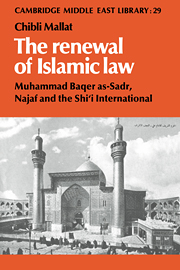Book contents
- Frontmatter
- Contents
- Acknowledgments
- Note on transliteration and dates
- General introduction: The law in the Islamic Renaissance and the role of Muhammad Baqer as-Sadr
- Part I Islamic law and the constitution
- Introduction to Part I
- 1 Archetypes of Shi'i law
- 2 On the origins of the Iranian constitution: Muhammad Baqer as-Sadr's 1979 treatises
- 3 The first decade of the Iranian constitution: problems of the least dangerous branch
- Part II Islamic law, ‘Islamic economics’, and the interest-free bank
- Conclusion: The costs of renewal
- Notes
- Bibliography
- Index
- Cambridge Middle East Library
2 - On the origins of the Iranian constitution: Muhammad Baqer as-Sadr's 1979 treatises
Published online by Cambridge University Press: 08 January 2010
- Frontmatter
- Contents
- Acknowledgments
- Note on transliteration and dates
- General introduction: The law in the Islamic Renaissance and the role of Muhammad Baqer as-Sadr
- Part I Islamic law and the constitution
- Introduction to Part I
- 1 Archetypes of Shi'i law
- 2 On the origins of the Iranian constitution: Muhammad Baqer as-Sadr's 1979 treatises
- 3 The first decade of the Iranian constitution: problems of the least dangerous branch
- Part II Islamic law, ‘Islamic economics’, and the interest-free bank
- Conclusion: The costs of renewal
- Notes
- Bibliography
- Index
- Cambridge Middle East Library
Summary
Introduction: on wilayat al-faqih
There is little doubt that the theory of wilayat al-faqih, as developed in Khumaini's lectures of Najaf, was most influential in the creation of the constitution passed in Iran in the wake of the Revolution. In these Najaf lectures, delivered in 1970, Khumaini developed the idea of the ‘ulama's responsibility in the state, in the form of an institutionalised structure which should be entrusted with the country's leadership.
The general thrust of the theory is not completely original. One can find the idea of the mujtahids' responsibility in the state developed much earlier in the century, for example when a dispute over Parliament and the new State of Iraq broke out in 1922–3. After the great revolt of Najaf against the British, which was led by the 'ulama, the continuation of this leadership through some representation in the state could not fail to be advocated in circles close to the Shi'i jurists:
The program of the ‘Union of ‘Ulama’, which was received in Kadhimain on November 7, 1926, from Shaikh Jawad al-Jawahiri and was read at the house of the 'alim Sayyid Muhammad as-Sadr on November 13, 1926, called for the establishment of a more intimate link between the 'ulama of Persia and Iraq; the formation of religious societies which would be charged with the welfare of Islam in general, and which would work in Persia and Iraq for the improvement of relations with Turkey and Soviet Russia; and lastly, the control of these societies by the mujtahids in their capacity as religious leaders of the people.
- Type
- Chapter
- Information
- The Renewal of Islamic LawMuhammad Baqer as-Sadr, Najaf and the Shi'i International, pp. 59 - 78Publisher: Cambridge University PressPrint publication year: 1993
- 2
- Cited by

